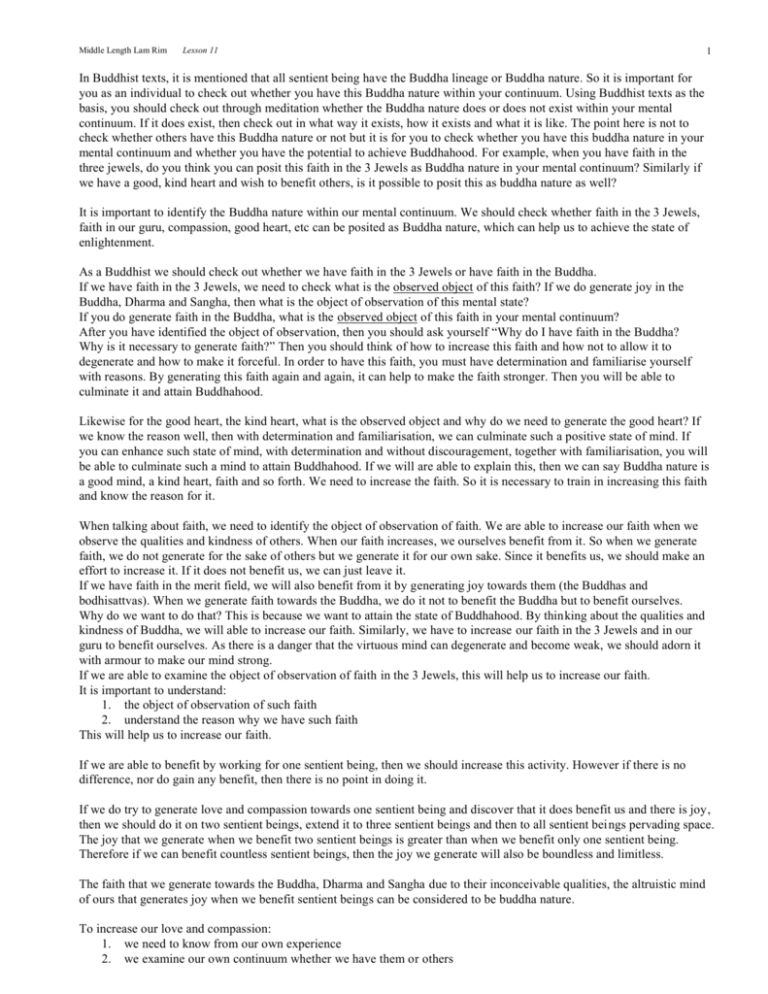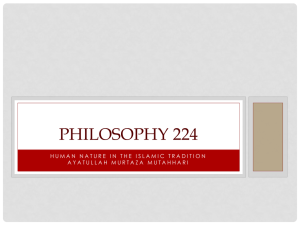Lesson 11edited
advertisement

Middle Length Lam Rim Lesson 11 1 In Buddhist texts, it is mentioned that all sentient being have the Buddha lineage or Buddha nature. So it is important for you as an individual to check out whether you have this Buddha nature within your continuum. Using Buddhist texts as the basis, you should check out through meditation whether the Buddha nature does or does not exist within your mental continuum. If it does exist, then check out in what way it exists, how it exists and what it is like. The point here is not to check whether others have this Buddha nature or not but it is for you to check whether you have this buddha nature in your mental continuum and whether you have the potential to achieve Buddhahood. For example, when you have faith in the three jewels, do you think you can posit this faith in the 3 Jewels as Buddha nature in your mental continuum? Similarly if we have a good, kind heart and wish to benefit others, is it possible to posit this as buddha nature as well? It is important to identify the Buddha nature within our mental continuum. We should check whether faith in the 3 Jewels, faith in our guru, compassion, good heart, etc can be posited as Buddha nature, which can help us to achieve the state of enlightenment. As a Buddhist we should check out whether we have faith in the 3 Jewels or have faith in the Buddha. If we have faith in the 3 Jewels, we need to check what is the observed object of this faith? If we do generate joy in the Buddha, Dharma and Sangha, then what is the object of observation of this mental state? If you do generate faith in the Buddha, what is the observed object of this faith in your mental continuum? After you have identified the object of observation, then you should ask yourself “Why do I have faith in the Buddha? Why is it necessary to generate faith?” Then you should think of how to increase this faith and how not to allow it to degenerate and how to make it forceful. In order to have this faith, you must have determination and familiarise yourself with reasons. By generating this faith again and again, it can help to make the faith stronger. Then you will be able to culminate it and attain Buddhahood. Likewise for the good heart, the kind heart, what is the observed object and why do we need to generate the good heart? If we know the reason well, then with determination and familiarisation, we can culminate such a positive state of mind. If you can enhance such state of mind, with determination and without discouragement, together with familiarisation, you will be able to culminate such a mind to attain Buddhahood. If we will are able to explain this, then we can say Buddha nature is a good mind, a kind heart, faith and so forth. We need to increase the faith. So it is necessary to train in increasing this faith and know the reason for it. When talking about faith, we need to identify the object of observation of faith. We are able to increase our faith when we observe the qualities and kindness of others. When our faith increases, we ourselves benefit from it. So when we generate faith, we do not generate for the sake of others but we generate it for our own sake. Since it benefits us, we should make an effort to increase it. If it does not benefit us, we can just leave it. If we have faith in the merit field, we will also benefit from it by generating joy towards them (the Buddhas and bodhisattvas). When we generate faith towards the Buddha, we do it not to benefit the Buddha but to benefit ourselves. Why do we want to do that? This is because we want to attain the state of Buddhahood. By thinking about the qualities and kindness of Buddha, we will able to increase our faith. Similarly, we have to increase our faith in the 3 Jewels and in our guru to benefit ourselves. As there is a danger that the virtuous mind can degenerate and become weak, we should adorn it with armour to make our mind strong. If we are able to examine the object of observation of faith in the 3 Jewels, this will help us to increase our faith. It is important to understand: 1. the object of observation of such faith 2. understand the reason why we have such faith This will help us to increase our faith. If we are able to benefit by working for one sentient being, then we should increase this activity. However if there is no difference, nor do gain any benefit, then there is no point in doing it. If we do try to generate love and compassion towards one sentient being and discover that it does benefit us and there is joy, then we should do it on two sentient beings, extend it to three sentient beings and then to all sentient beings pervading space. The joy that we generate when we benefit two sentient beings is greater than when we benefit only one sentient being. Therefore if we can benefit countless sentient beings, then the joy we generate will also be boundless and limitless. The faith that we generate towards the Buddha, Dharma and Sangha due to their inconceivable qualities, the altruistic mind of ours that generates joy when we benefit sentient beings can be considered to be buddha nature. To increase our love and compassion: 1. we need to know from our own experience 2. we examine our own continuum whether we have them or others Middle Length Lam Rim 3. 4. 5. Lesson 11 2 we know what happens when they are being generated in our mind we check out the object of observation, we analyse the reasons why we need to generate love and compassion We need to examine our own continuum whether we have love and compassion for others. By analysing in this way, we will able to generate a strong and stable determination in our own mind regardless whether we have a happy life, we are sad, we have problems in our life, we are joyful etc. As we have talked about the mind of enlightenment, it is important to understand: 1. what the object of observation is and 2. the reason why we generate such a mind It is important to have the determination with respect to the mind of enlightenment by thinking how all sentient beings have been our mothers, recalling their kindness etc and the method of exchanging self and others. We must train to increase the mind of enlightenment. This will lead to wholehearted resolve and we’ll want to take responsibilities. When this happens, we can take the ritual for adopting bodhicitta and engage in the training of the bodhisattva. Thereafter we can train in the six perfections. Therefore it is necessary that your mind is adorned with armour and has a strong determination. Or else, it is difficult for us to train in the six perfections for the sake of all sentient beings. As mentioned in the Lama Chopa Puja (LC104) or Guru Puja, Even if I must remain for an ocean of eons in the fiery hells of Avici, For the sake of even just one sentient being, I seek your blessings to complete the perfection of joyous effort, To strive with compassion for supreme enlightenment and not be discouraged. In order to have armour in your mind to have strong determination, you must understand the reasons why you need to generate love and compassion for sentient beings. Or else there is no way for us to have such determination. Just like engaging in business or study, we do it because we can see the reason for doing it. We then generate interest and determination for doing it. Similarly, we should understand the reason and purpose for generating such a mind and engaging in them. So if by engaging in it it does benefit us, we should train to increase it. If we find that there is suffering in our mind (such as unhappiness, three poisons in our mind), we need to determine what: 1. the object of observation is and 2. the reason why we generate such a mind 3. whether it benefits us When we have a disturbing mind that is not peaceful, we should try to identify the object of observation. If we identify what object this disturbing mind is observing, we can discard this object of observation and this leads to a decrease in the affliction. We should check the reason why we generate such a mind. We should also check out whether this state of mind does benefit us or other people. After checking and discovering that this disturbing mind does not benefit us, we should discard the object of observation. As our mind has positive factors (such as a kind heart) and disturbing factors, we should increase those positive or beneficial factors and decrease those disturbing factors. We should increase the positive factors because they benefit us and others. Whereas we should decrease the disturbing factors as they harm ourselves and others. However the problem is that for us to increase the positive factors is quite difficult whereas to increase the disturbing factors is extremely easy. The reason for this, as mentioned in the text, is because we have constantly familiarised with the three poisons in our mental continuum and it is extremely easy for the disturbing factors to arise without effort. The positive factors are not as easy to increase because we are not familiar with them. Therefore we need to put in effort and undergo hardship to increase these positive factors of the mind. As explained previously, if we have determination and put in effort, the state of enlightenment is not far away. It is not enough for us just to put in effort. We also need to know the method unmistakably and perfectly for us to achieve the state of enlightenment. In the last lesson, we started to look at the wrong view of the Chinese Buddhist monk He Shang and also refuted his view. Ha Shang tried to assert that all conceptions in the mind have to be abandoned. The path to Buddhahood is by thinking nothing at all in the mind Ha-shang attempts to prove this position by citing, from the sutras, eighty passages which extol this state of mind that lacks any thought. Basically He Shang quoted three sources to prove his case that it is not necessary to train in the perfection in generosity. We have to refute his position with our system. He Shang’s assertion that taking nothing at all to the mind is the path to Buddhahood deprecates (or belittles) all factors and methods in our system. He also said that it is not necessary to realise Middle Length Lam Rim Lesson 11 3 selflessness or emptiness with wisdom. His assertion is not acceptable to our system because by advocating such assertions, we deprecate both method and ultimate wisdom in our system. He Shang advocates that it is not necessary to meditate on the conventional side of phenomenon which contradicts with the Buddha’s text. His assertion of taking nothing at all to the mind is the meditation on emptiness. This contradicts all the scriptures. The final object or goal that is to be obtained by those who follow the Mahayana path is non-abiding nirvana. This is a state that does not abide in samsara and also a state that does not abide in nirvana, i.e. it does not abide in the two extremes of cyclic existence and solitary peace. If we abide in cyclic existence, we do not accomplish the welfare of ourselves or of others as we have not passed beyond the nature of suffering. As we ourselves are in the state of suffering, there is no possibility that we can free others from suffering. Similarly if we abide in solitary peace or nirvana, we do not accomplish the welfare of others because we have not yet completed our own purpose. Why is it that by abiding in solitary peace or nirvana, our own purpose is not complete? This is because we have not yet completely abandoned the knowledge obstructions (obstructions to omniscience) even though we have abandoned the afflictive obstructions. As we have not yet abandoned the knowledge obstructions, our mind is still obscured. Therefore our own purpose has not yet been completed and it is difficult to fulfil the welfare of others in this state. It is only through wisdom realising emptiness that we don’t abide in cyclic existence. For nonabiding in solitary peace or nirvana, it is through compassion where the factor of method. Therefore to achieve a non-abiding in cyclic existence and nirvana, we need to be trained in both method and wisdom. The path of these persons [who meditate on not thinking] is indeed not at all in the direction or vicinity of a meditation on emptiness. But even if you were to allow that it is a meditation on emptiness, you would not then go on to say that those with the knowledge that comes from their cultivation of a faultless method of meditation, after they have found the unmistaken meaning of emptiness, should meditate on emptiness alone and "not cultivate conventional states of mind pertain ing to deeds," or, alternatively, "do not have to strive at those conventional states of mind in a variety of ways, upholding them as the core practice." To say such things contradicts all the scriptures and completely flies in the face of reason, for the goal for practitioners of the Mahayana is a non-abiding nirvana. For this you have to achieve non-abiding in cyclic existence via the wisdom that knows reality, the stages of the path contingent on the ultimate, the "profound path," the collection of sublime wisdom, the so-called "factor of wisdom." You also have to achieve a non-abiding in the peace that is nirvana via the wisdom that understands the diversity of phenomena, the stages of the path contingent on conven tional truths, the vast path, the collection of merit, the so-called "factor of method." It is only through wisdom realising emptiness that we are not abiding in cyclic existence. The reason for us to abide in cyclic existence is ignorance of self grasping. In order to destroy such ignorance, we need an antidote which is the wisdom that realises emptiness. Wisdom realising suchness, the gradual path realising the ultimate, the path of the profound, wisdom aspect and accumulation of wisdom are synonymous. Why is compassion preventing us from abiding in solitary peace or nirvana? Compassion is a mind that observes sentient beings and wishes them to be free from suffering. If we do have compassion and observe that others are suffering, we will not be able to abide in the state of solitary peace. With the understanding that the wisdom realising emptiness and compassion stop us from abiding us in cyclic existence and solitary peace, we can ascertain just what such a state is. If somebody were to ask you “what is non-abiding nirvana?” you should be able to explain that it does not abide in two extremes of solitary peace and cyclic existence. What blocks cyclic existence and what blocks nirvana? The Sutra of Showing the Tathagata's Inconceivable Secret thus says: The collection of sublime wisdom eliminates all afflictions. The collection of merit nurtures all living beings. Bhagavan, since this is the case, mahasattva bodhisattvas should strive for the collections of sublime wisdom and merit. The Questions of Sky Treasure Sutra says: With the knowledge of wisdom, you completely eliminate all afflictions. With the knowledge of method, you include all living beings. The Sutra Unravelling the Intended Meaning says: Utterly turning away from the welfare of all living beings and utterly turning away from all participation in motivated action, I have not taught these to be unsurpassed, perfect enlightenment.









